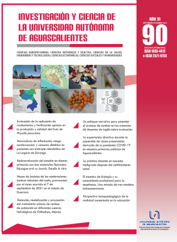The biology teacher and his professional knowledge for teaching. A look at three Latin America models
DOI:
https://doi.org/10.33064/iycuaa2023904234Keywords:
Professional knowledge of biology teachers, biology teacher epistemology, pedagogical content knowledge, biology teacher’s education, biology teaching, Latin AmericaAbstract
A difficulty that concerns the teaching of biology in Latin America is the quality of teacher education and training, specifically, the knowledge that the teacher must have is questioned. Then, what are the Latin American theoretical or methodological models related to the knowledge of the biology teacher and what do they offer to teacher education and training? The objective of the article is to make a theoretical reflection on three Latin American models of the biology teacher’s professional knowledge. It is intended to contribute to the understanding of useful models for pre-service and in-service biology teachers, as well as provide a theoretical review of professional knowledge models developed from Latin America. These models consider the cultural, biographical and real context influence, that is the reason why they are suitable for the teacher education and training and also the improvement of the teaching practice of the Latin American teacher.
Downloads
Metrics
References
• Aguilar, A., Carmona, E., Carrillo, J., Contreras, L., Climent, N., Escudero-Ávila, D., Flores-Medrano, E., Flores, P., Huitrado, J., Montes, M., Muñoz-Catalán, M., Rojas, N, Sosa, L., Vasco, D., & Zarkayan, D. (2014). Un Marco teórico para el Conocimiento Especializado del Profesor de Matemáticas. España: Universidad de Huelva Publicaciones.
• Burns, B. y Luque, J. (2014) Profesores excelentes. Cómo mejorar el aprendizaje en América Latina y el Caribe.Washington D.C.: BID.
• Carrillo, J., Climent, N., Contreras, C., & Muñoz-Catalán, M. (2013). Determining Specialized Knowledge for mathematics teaching. En B. Ubuz (ed.), Proceedings of the Eight Congress of the European Society for Research in Mathematics Education (pp. 2985-2994). CERME.
• Espinosa-Ríos, E., González-López, K., & Hernández-Ramírez, L. (2016). Las prácticas de laboratorio: una estrategia didáctica en la construcción de conocimiento científico escolar. Entramado, 12(1), 266-281.
• Fernandez, C. (2014). Knowledge base for teaching and pedagogical content knowledge (pck): some useful models and implications for teachers’training. Problems of Education in the 21st Century, 60(1), 79-100.
• Fonseca, G. (2018). El conocimiento profesional del profesor de biología sobre biodiversidad. Un estudio de caso en la formación inicial durante la práctica pedagógica en la Universidad Distrital Francisco José de Caldas (Tesis doctoral). Universidad Distrital Francisco José De Caldas, Bogotá, Colombia.
• Fonseca G., Ibáñez, S., Ravanal, E., Cassiani, S., & Peñaloza, G. (2021). Una perspectiva latinoamericana para la configuración de una educación en biología, en clave de construcción de ciudadanías. Tecné, Episteme y Didaxis: TED, 3488-3494.
• Hernández, A., Correa, M., & Guerra, Y. (2013). Los problemas de trabajo abordados en la enseñanza de la biología, una mirada desde el estado del arte de la revista The American Biology Teacher 2007. Bio-grafía, 705-714.
• Juárez, L., García, F., Belauzarán, J., & Vara, L. (2021). Pensamiento complejo para maestros en el auge de la metadisciplina. Revista Biológico Agropecuario Tuxpan, 9(1), 153-167.
• Luís, M., & Carrillo, J. (2020). O modelo do conhecimento especializado do professor de Biologia (BTSK). Revista De Ensino De Ciências E Matemática, 19-36.
• Marques, M., & Gomes, J. (2020). Conocimientos especializados de profesor de biología movilizados en una clase práctica sobre interacciones ecológicas. Revista Amazônica de Educação em Ciências e matemática, 8(2), 253-271.
• Marques, M., Coelho, S., Silva, J., & Gomes, J. (2021). Conexões de conhecimentos especializados de professores de Biologia sobre temas do Ensino Médio. Research Society and Development, 10(12), 1-12.
• Park, S., & Oliver, J. (2008). Revisiting the Conceptualisation of Pedagogical Content Knowledge (PCK): PCK as a Conceptual Tool to Understand Teachers as Professionals. Research in Science Education, 38(3), 261-284.
• Porlán, R., Rivero, R., & Martín, R. (1997). Conocimiento profesional y epistemología de los profesores I: Teoría, métodos e instrumentos. Enseñanza de las ciencias. Revista de investigación y experiencias didácticas, 15(2), 155-171.
• Ravanal, E., & Quintanilla, M. (2012). Concepciones del profesorado de biología en el ejercicio sobre el aprendizaje científico escolar. Enseñanza de las Ciencias, 30 (2), pp. 33-54.
• Shulman, L. (1986). Those Who Understand: Knowledge Growth in Teaching. Educational Researcher, 15(2), pp. 4-14.
• Shulman, L. (1987). Knowledge and teaching: foundations of the new reform. Harvard Educational Review, 57(1), 1-22.
• Stasinakis, P. K., & Kalogiannnakis, M. (2017). Analysis of a Moodle-Based Training Program about the Pedagogical Content Knowledge of Evolution Theory and Natural Selection. World Journal of Education, 7(1), 14-32.
• Vaillant, D. (2016). El fortalecimiento del desarrollo profesional docente: una mirada desde Latinoamérica. Journal of supranational policies of education, 5, 5 –21.
• Valbuena, E. (2007). El Conocimiento Didáctico del Contenido Biológico. Estudio de las concepciones disciplinares y didácticas de futuros docentes de la Universidad Pedagógica Nacional (Tesis doctoral). Universidad Complutense de Madrid, España.
• Valbuena, É. (2011). Hipótesis de progresión del conocimiento biológico y del conocimiento didáctico del contenido biológico. Parte I: referentes teóricos. Tecné, Episteme y Didaxis: TED, (30), 30-52.
• Verdugo-Perona, J., Solaz-Portolés, J., & Sanjosé-López, V. (2017). El conocimiento didáctico del contenido en ciencias: estado de la cuestión. Cuadernos de Pesquisa, 47(164), 586-611.
• Vergara, C., & Cofré, H. (2014). Conhecimento Pedagógico do Conteúdo: o paradigma perdido na formação inicial e continuada de professores no Chile? Estudios pedagógicos (Valdivia), 40(Especial), 323-338.
Published
License
Copyright (c) 2023 Indira Viridiana Medina-Mendoza, David Alfonso-Páez, Alma Adrianna Gómez-Galindo

This work is licensed under a Creative Commons Attribution-NonCommercial-ShareAlike 4.0 International License.
Las obras publicadas en versión electrónica de la revista están bajo la licencia Creative Commons Atribución-NoComercial-CompartirIgual 4.0 Internacional (CC BY-NC-SA 4.0)





